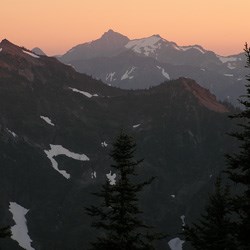Camping
Food Storage Method: Bear canisters are required at Dodger Point due to the lack of good trees for hanging food. Food, garbage, and scented items must be hung at least 12 feet high and 10 feet out from the nearest tree trunk, or stored in bear canisters.
Campsites: Always camp on bare ground, not on vegetation, in the high country and at least 200 feet from water sources.
Toilet Facilities: None. Bury waste 6-8" deep and 200 feet from water sources and campsites. Please pack out toilet paper. Urinate on rocks or the trail to prevent deer and mountain goats from pulling up fragile plants to get at the salt in urine.
Water Source: Elwha River, springs near Dodger Point. Always boil, filter, or chemically treat your drinking water to prevent Giardia.
Stock: Allowed, but not recommended. See Stock Use.

